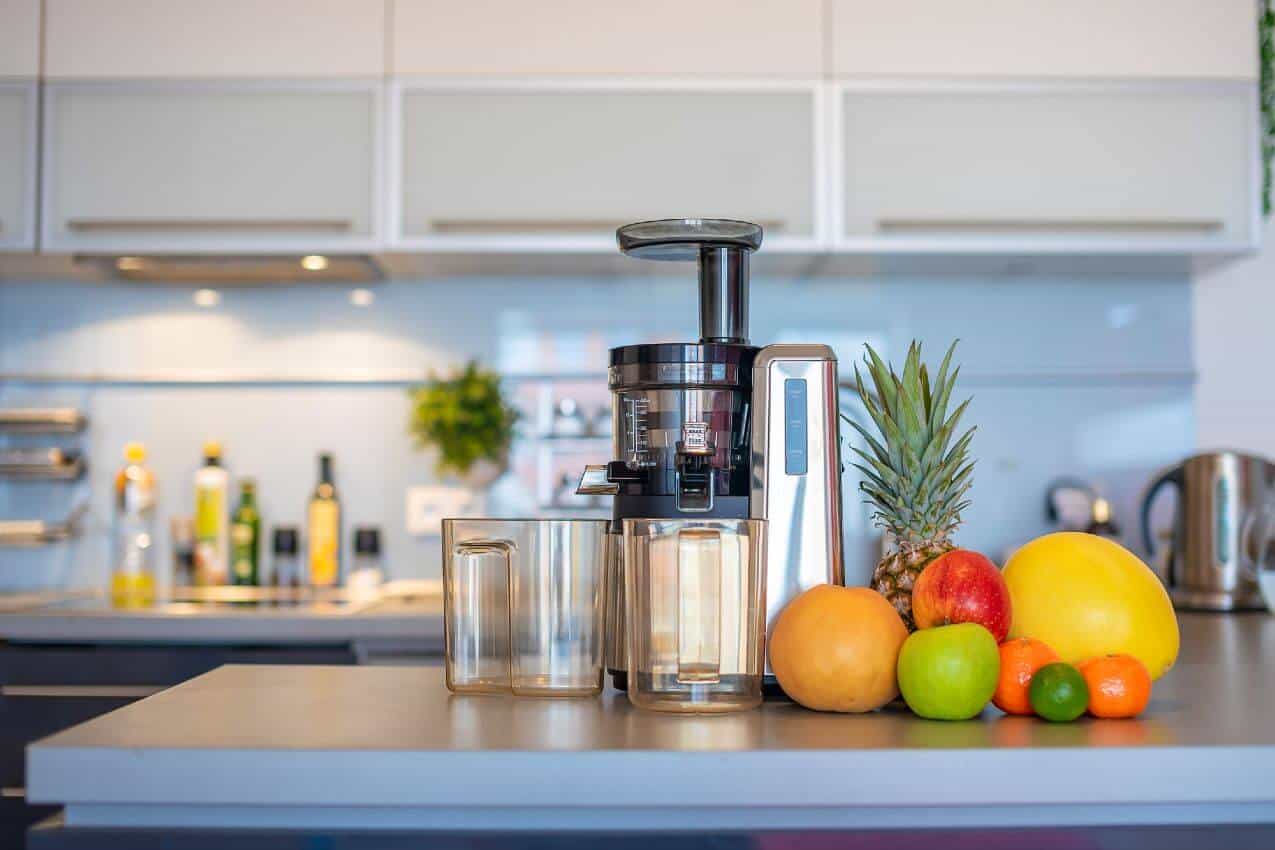If you have been looking around for a juicer recently, you’ve come across the dilemma of choosing between masticating vs centrifugal juicer. Don’t worry, I know the struggle. I’ve been there about 3 years ago when I was getting my own juicer. It was confusing as at the time I don’t even know what “centrifugal” or “masticating” means! I mean who would have thought there are different types of juicers?
Today let’s look at what the long-time debate is about. Is one better than the other? Or is the difference being how they look like? What are their similarities? How about differences? What makes them special? We’ll answer all these questions to help you decide which juicer is the best for you.
Masticating Juicer
Hurom H-AA Slow Juicer
This type of juicer processes fruits and vegetables by imitating how us humans chew food. They have gears or augers that rotates at a very low speed as you feed the product to its usually extra wide chute. This process loosens up the pulps in the product and makes it easier to extract the juices, thus getting a higher juice yield than regular juicers.
No products found.
The loosened-up produce is then pressed through a strainer into the juice cap. This separates the pulp from the valuable fiber and nutrients of the fruit or vegetable. They have either one or two augers, whereas you’ll typically find more expensive models having twin augers. This results in a higher quality of purely natural juice. This juice has all the significant vitamins and minerals from your favorite whole foods.
Wellness fact: Did you know that Juices extracted from masticating juicers do not cause bloating? This is because there is minimal oxygen introduced to it in the juicing process. We are pretty sure you will hurry to grab the best masticating juicer when you realize that you are missing on what are the health benefits of a masticating juicer, learn more and achieve the healthy lifestyle you’ve been wanting to achieve.
Pros:
- Masticating juicers process food anywhere from 80 to 100 RPM. This slow juicing process ensures that the juice retains more nutrients and minerals from the whole food.
- Less oxidation is introduced during the process, so the juice gets a deeper color, richer flavor, and overall better texture.
- Most masticating juicers are versatile and can be used to make baby food, nut butter, and even fresh pasta!
Cons:
- Masticating juicers come with quite a hefty price tag compared to centrifugal juicers. This is because of their added features and more advanced technology.
- They come with several detachable parts and has a lot of nooks and crannies that can be hard to clean. Thankfully, they almost always come with their own cleaning tools.
Centrifugal Juicer
Breville 800JEXL Juice Fountain Elite Centrifugal Juicer
This is a modern and upgraded version of your handy dandy twist and spin juicers. The way these juicers work is that you put the product into the chute, and it is then pushed down by a built-in tamper. This tamper pushes the produce towards a centrifuge that spins continuously to squeeze the juices out of the fruits and veggies.
No products found.
This centrifuge has tiny holes where the juice goes through. This then goes into a sharp screen to filter the pulp from the extract. Centrifugal juicers are also known as fast juicers. So it’s best for when you need to grab a quick and healthy drink in the morning.
Pros:
- Centrifugal juicers are generally less expensive than masticating juicers. They are also easier to find. A high-end centrifugal juicer can cost just as much as a regular masticating juicer.
- These juicers process juice faster than masticating juicers. The fast-spinning centrifuge can give you fresh fruit juice in less than 5 minutes!
- Centrifugal juicers can process tough fruits and vegetables well.
- This type of juicer is also generally easier to clean.
Cons:
- Centrifugal juicers are not compatible with juicing leafy greens. They are unable to fully extract the juices from greens like kale, spinach, or wheatgrass.
- This type of juicer process produce in a way that introduces more oxidation. This reduces the quality of the juice and causes them to spoil faster. This is why juice made from centrifugal juicers is only consumable within 24 hours
Final Thoughts:
Masticating juicer is best for you if you’re looking to make the most use out of your investment. You can use it to make smooth, high-quality green juice. It can also help you in your other recipes like nut butter, baby food, or even pasta.
Get a centrifugal juicer if you’re not planning to use it for green juice. It’s affordable, easy to clean, and can make you a fresh juice in a quick minute.
At the end of the day, it still depends on your personal preferences and how you are planning to use it. Which one do you have or planning to get? How is your experience using it? Feel free to share your thoughts in the comments below! ♥


